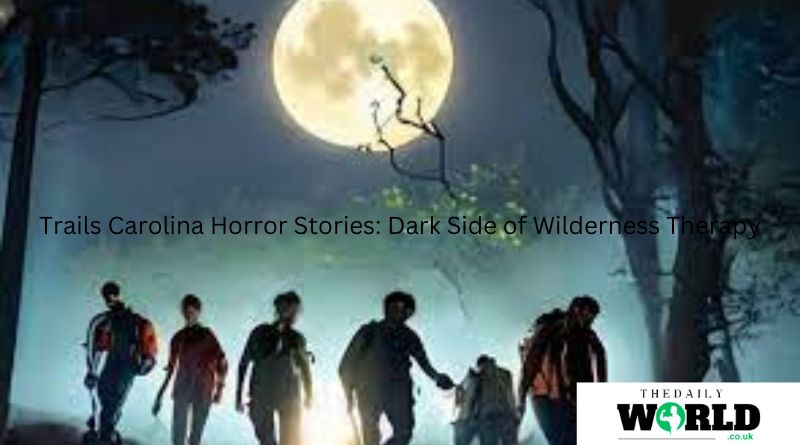Wilderness therapy programs have gained popularity over the years as alternative solutions for troubled teens. Among these programs, Trails Carolina stands out. However, beneath the surface of serene landscapes and promises of transformation, there lies a darker narrative. The phrase “Trails Carolina horror stories” has become synonymous with unsettling experiences, raising questions about the efficacy and safety of wilderness therapy.
The Concept of Wilderness Therapy
Wilderness therapy is designed to use nature and outdoor activities as therapeutic tools to help adolescents with behavioral, emotional, and psychological issues. The concept revolves around removing teens from their usual environment and placing them in a controlled wilderness setting. This method aims to foster personal growth, self-reliance, and emotional healing through challenging outdoor activities and guided therapy sessions.
Trails Carolina: A Brief Overview
Trails Carolina is one of the prominent wilderness therapy programs in the United States. Located in the picturesque Blue Ridge Mountains of North Carolina, it offers a blend of traditional therapeutic approaches and outdoor adventures. The program boasts a structured environment where teens can learn coping skills, develop healthy habits, and build resilience. The promise is enticing: a chance for troubled teens to reset their lives and return home transformed.
Unveiling the Dark Side
Despite its appealing premise, Trails Carolina has been the subject of numerous horror stories. These accounts often highlight severe emotional distress, inadequate medical care, and unqualified staff. While some participants and their families report positive outcomes, others share experiences that suggest a more sinister side to the program.
Emotional and Psychological Toll
One of the most common themes in Trails Carolina horror stories is the emotional and psychological toll on participants. Teens are often sent to these programs against their will, leading to feelings of abandonment and betrayal. The isolation from family and friends, coupled with the harsh wilderness environment, can exacerbate pre-existing mental health issues.
Former participants have described experiences of emotional manipulation and coercion. Therapists and staff, in their attempt to break down resistance, may use confrontational tactics that can leave lasting scars. These methods can undermine self-esteem and exacerbate anxiety and depression rather than alleviating them.
Inadequate Medical and Psychological Care
Another critical issue raised in Trails Carolina horror stories is the adequacy of medical and psychological care. Wilderness therapy programs are often situated in remote areas, far from immediate medical assistance. While Trails Carolina employs medical staff, former participants have reported instances of inadequate care and delayed medical intervention.
The psychological support provided is also a point of contention. Critics argue that the therapists in these programs are not always equipped to handle severe mental health crises. The combination of physical exhaustion from outdoor activities and insufficient psychological support can lead to dangerous situations for vulnerable teens.
Unqualified and Undertrained Staff
The qualifications and training of staff members at Trails Carolina have been called into question. Wilderness therapy programs typically employ a mix of licensed therapists, outdoor educators, and support staff. However, not all staff members possess the necessary training to deal with the complex emotional and psychological needs of the participants.
Former staff members and participants have recounted instances where staff were ill-prepared to handle crises or provide appropriate support. This lack of training can lead to mishandling of situations, further endangering the well-being of the teens in their care.
Physical Hardships and Safety Concerns
The physical challenges of wilderness therapy are integral to the program’s philosophy. However, these challenges can sometimes cross the line into dangerous territory. Stories of teens being pushed beyond their physical limits, enduring harsh weather conditions without proper gear, and suffering injuries without timely medical attention are not uncommon.
Safety concerns extend beyond the physical to include emotional and psychological safety. The confrontational and often punitive approach taken by some staff members can create an environment of fear and anxiety, hindering the therapeutic process.
The Role of Parents and Guardians
Parents and guardians play a crucial role in deciding to send their children to wilderness therapy programs like Trails Carolina. The marketing materials and success stories presented by these programs can be compelling. However, it is essential for parents to conduct thorough research and consider both positive and negative reviews.
Understanding the potential risks and horror stories associated with Trails Carolina can help parents make informed decisions. Open communication with program staff, seeking independent reviews, and considering alternative therapeutic options are vital steps in ensuring the safety and well-being of their children.
Regulatory Oversight and Accountability
The lack of stringent regulatory oversight in the wilderness therapy industry is a significant concern. While some states have implemented regulations, others have minimal oversight, allowing programs to operate with little accountability. This lack of regulation can result in inconsistent standards of care and varying levels of safety and effectiveness.
Advocates for reform argue that increased regulatory oversight and standardized accreditation processes are necessary to protect participants. Implementing uniform standards for staff training, medical care, and therapeutic approaches can help mitigate the risks associated with wilderness therapy programs.
Alternatives to Wilderness Therapy
For parents considering wilderness therapy, it is important to explore alternative options. Traditional outpatient therapy, residential treatment centers, and community-based programs can provide structured support without the potential risks associated with wilderness therapy. Each child’s needs are unique, and finding the right fit requires careful consideration of various therapeutic approaches.
Conclusion: Weighing the Risks and Benefits
Wilderness therapy programs like Trails Carolina offer the promise of transformation and healing. However, the horror stories associated with these programs highlight the need for caution and thorough research. Understanding the potential risks, including emotional and psychological distress, inadequate medical care, and unqualified staff, is crucial for parents and guardians.
Read also: check













